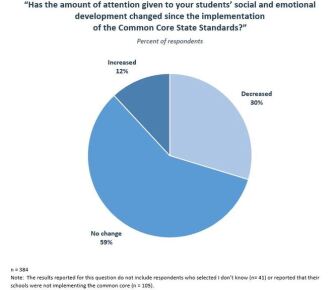In a curriculum crowded with an ever-expanding array of initiatives and subjects, social and emotional learning has established its importance in the eyes of 500-plus teachers and school-based administrators who took an Education Week Research Center survey on the topic this spring.
About two thirds of respondents (67 percent) perceived that social and emotional learning is “very important” to student achievement, according to a survey analysis published Tuesday. That’s up from 54 percent in 2014, when the research center asked educators the same question on a different survey.
For the purposes of the survey, social and emotional learning was defined as education related to the “management of emotions, relationships, and decision-making.”
Even as schools tackle the often time-consuming tasks related to common core implementation, the attention paid to social and emotional learning has not waned, survey results suggest. More than 70 percent of respondents whose schools were adapting to the standards reported that attention to social and emotional learning had increased or remained the same since implementation began.

In the current age of accountability, it’s often true that what gets measured gets managed. More than two thirds of educators said their schools measured social and emotional learning. Classroom observations were the most common assessment tools, and their results were most frequently used to identify students who needed assistance and to assign them to specific interventions.
Although survey results suggested that social and emotional learning has established a foothold in schools, respondents also identified challenges and needs. Just under half of respondents said their schools paid too little attention to social and emotional learning. More than two thirds indicated they had had some training in social and emotional learning and that they wanted more. In responding to an open-ended question about their greatest social and emotional learning challenges, roughly one in three respondents lamented that other things took priority, leaving limited time for social and emotional learning.
“There is a tremendous amount of content to cover in class, particularly since the transition to common core and the resulting SBAC [Smarter Balanced Assessment Consortium] assessments,” one such respondent wrote. “Social / Emotional learning, if not properly embedded throughout the lessons throughout the year, can feel like one more gimmicky ideology tacked onto education, void of real meaning for students and teachers, but nonetheless an ideology that looks good on paper. In order to have true long lasting success, social / emotional learning needs to occur in all the classes, not just isolated in AVID [Advancement Via Individual Determination] or interventions for at-risk students, consistently throughout the year.”
In another open-ended question, respondents were asked to identify the most effective strategies they used to improve students’ social and emotional learning. The most frequent response reflected the comment above, with educators suggesting that social and emotional learning needed to be integrated into existing curriculum and school activities.

The results described above are based on an online survey that the Education Week Research Center distributed in April 2015 to a random sample of edweek.org registrants who had previously identified themselves as classroom teachers, instructional specialists, or school-based administrators. Although the sample was not statistically representative of the nation’s educators, the respondents were a diverse group of teachers and administrators representing a wide range of grade levels, experience, and school settings. The 2015 survey analysis included 562 educators while the 2014 analysis included a similar sample of 504 respondents.
The Education Week Research Center is a division of Editorial Projects in Education, the non-profit organization that publishes Education Week. The social and emotional learning survey was conducted with support from the Atlantic Philanthropies, the California Endowment, the NoVo Foundation, and the Raikes Foundation, which also support coverage of school climate issues in Education Week.
The full report can be found here.
Holly Yettick directs the Education Week Research Center.
Related:
- Survey: Student Success Calls for More Than Academic Skills
- Urban Districts Embrace Social-Emotional Learning
- Student Insights Guiding Districts on Policy and Practice
